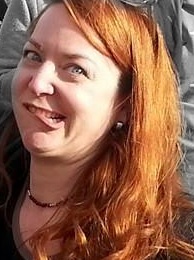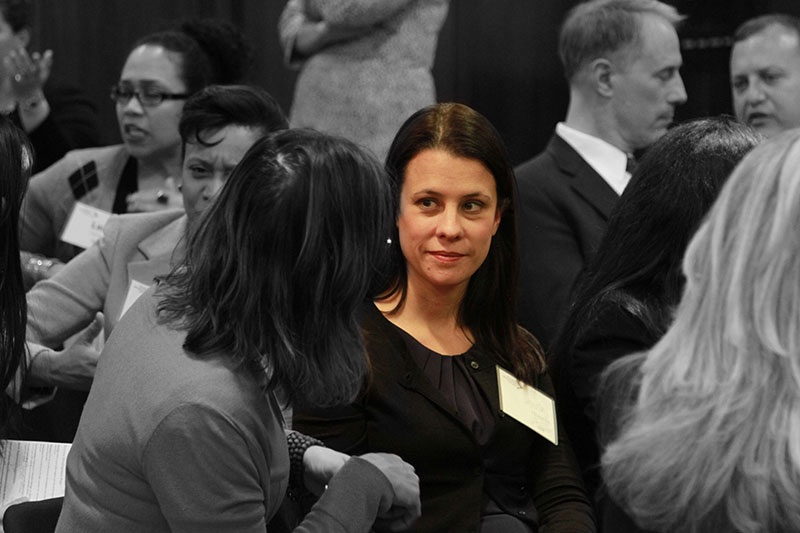If you read Dentaltown Magazine, you may have received the edited, paper version of this article today in your snail mail box. But because I don’t have to make room for saliva ejector advertisements in the sidebar (seriously, this article helps sell SALIVA EJECTORS!) you can enjoy the original here in its more raw form.
A hygienist’s answer to “What do you do?”
by Trish Walraven RDH, BS
You’re at a gathering of acquaintances, a general hob-nobbery of casual conversing, one of those social obligations that you love/hate because you’re really more of an outgoing introvert, someone who plays well with others but enjoys their quiet, navel-gazing world too. Sooner or later you know that the question will be asked.
“So, what do you do?”
No hesitation here. You know what your profession is. You have a title, a position, a calling.
Then that inner part of your thinking begins to twitch.
You weren’t asked about your job title, actually. You were asked a direct question: What do you do?
The typical reaction of hearing that you’re a dentist or hygienist involves a full disregard of the art and compassion that you put into your profession. People want to tell you about their bad experiences as a child, or how much they hate you (but don’t take it personally!). They just nod, warily, quietly, at your response and quickly think of a way to change the subject.
Instead of giving away the conversation and letting it slide into other people’s thought bubbles, then, you can steer the dialogue back to the original question, and the feel-good answer you’ve prepared instead.
“I take care of people’s teeth.”
You’re a regular Mother Theresa now, aren’t you? The way you dedicate your life’s work to helping others, it’s so freaking noble. This response elicits a smile of comfort and familiarity from your obligatory small-talk partner. The conversation can move forward now that your profession has been deemed socially acceptable.
An hour later, driving home, you’re blissfully alone with your thoughts, rewinding your earlier social interactivity, musing over the highlights, and you really, deeply, ask yourself in hindsight, “what do I do?”
I can’t speak for dentists, but if you’re a dental hygienist, you do some pretty strange things, actually.
First of all, perfection to you is wave-shaped. It’s the curve of a thin scallop of attached pinkness that anoints each interproximal space with a coral-tipped point of the healthiest gingiva imaginable. Anything less than this in your patients’ mouths is limbo. Chaos is the reason your job exists, but you always hunger for order and balance. To achieve this imagined perfection in a mouth that is not optimal, then, means that you often resort to some diversions along the way. It’s about the journey, not the destination, right?
How do you handle the patient whose lower anterior linguals are piled with a couple of grams of Grade A calcium phosphate? Sure, you could just chunk the calculus off. But sometimes, when you’re feeling a little dastardly, you carve out the top and the bottom of the tartar evenly, so that you’ve left a neat chalky white mustache, complete with curlicues. With artistic satisfaction, you turn your attention back to your duty and politely erase the Banksy-esque dental graffiti from your patient’s teeth.
This is not something you tell people that you do.
You also tell no one that your deepest fear is running into anything artificial while you’re cleaning someone’s teeth. Your ultrasonic scaler turns into a fierce lead pencil in those situations, which means not only that you are wearing down your precious metal antennae into useless nubs, but also that you’re leaving dark lines where there was once only whiteness. Every last bit of old orthodontic cement has now been revealed like a charcoal rubbing, thanks to you. And you would never admit to leaving a grey streak on a brand new porcelain crown. How could you slip like that? You hope like heck that the prophy paste will get that scary line off before anyone notices.
When it comes to things that you enjoy, then, there’s a bit of hesitation about sharing those stories as well. Like hovering around the periapical abcess that’s begging to be relieved? Or when you’re spraying baking soda slurry under a bridge and the patient becomes aware that its odor speaks more than the thousand words that you could ever say about superfloss? To you the stink is like scoring a point. Or why your trophy at the end of a particularly difficult appointment is a 2×2 gauze loaded with something that looks like buckshot, but is really your patient’s carefully extracted calculus? Fun times.
Probably the most difficult part of your career, though, has to do with patient management. Unless you’re regularly disengaging people from their mouths via nitrous oxide, there are forceful tongues, and lip pulls, and saliva ropes, and people who forget that it’s safe to swallow their own spit. Suck. Suck. Suck. Ten times a minute. At least this way they’re remembering to breathe. When they forget to breathe they feel like they are drowning. It’s not the water; they’re just suffocating because you’re blocking any chance of mouth breathing. Never mind that noses are much more optimal for breathing but whatever. Not everyone has learned how to snorkel either. And how do you convince patients that unless they just ate a handful of almonds, brushing immediately before their dental appointment won’t make your task any easier?
Then there are the patients themselves. Not just their mouths, but the whole person. Patients whose embarrassment about their teeth are the reason they haven’t been to a dentist in a while. People who not only open their mouths but open up to you, tell you their secrets, their fears, their wishes and hopes. People who trust you to take care of them, to love them, to nurture them towards health. They see something special in your eyes, and they open wide.
So go ahead and make it known out there in the big world that you’re hygienist. Or a dentist. You scale teeth. You drill teeth. No biggie. That’s what you do.
What really matters, though, are the reasons why.
 Trish Walraven RDH, BSDH is a mom and practicing dental hygienist in the suburbs of Dallas, Texas. She is a bit of an an introvert when she’s writing dental articles, but you get her together with her best friend from high school and Irish festival beer and she begins to make faces like this. She also makes faces like this under her mask if her patients aren’t paying attention to her flossing instructions.
Trish Walraven RDH, BSDH is a mom and practicing dental hygienist in the suburbs of Dallas, Texas. She is a bit of an an introvert when she’s writing dental articles, but you get her together with her best friend from high school and Irish festival beer and she begins to make faces like this. She also makes faces like this under her mask if her patients aren’t paying attention to her flossing instructions.

Thank you for this!! It resonated so much with me. Kudos on the Irishness and the awesome face pic.
Hi Trish,
Loved your article. I graduated 45 years ago this June from Forsyth in Boston and am officially “retiring” at the end of the month when I will let my license lapse and get rid of my uniforms.
I had worked for over 30 years in in 2 wonderful offices, general and ortho. I feel very fortunate to have worked in what I call the “Golden Age” of dentistry. That ended when both offices were sold and “nothing would change”, but, of course everything did.
I was forced out by one conglomerate and left the other because I couldn’t tolerate conditions. Patients had become friends and then, I was out with no balloons, no cake, no card, NO ENDING and lots of heartache. I loved my work, my offices, and my profession. It has taken 5 years and lots of help to get over this. I now volunteer at our local hospital and love that too. My void has been filled.
This is the first time I have written in but I felt connected to you. I too, feel that I am an “outgoing introvert” So this is my swansong. It was great but it is now over and I will say that I used to a hygienist. Thank you for letting me unleash my feelings and say goodbye to my profession that I did indeed love.
Sincerely,
Carol Moquin RDH
Hey Carol, and anyone else who is interested in helping dependent adults from dying of dirty teeth: Check us out and join us at Hylifellc! This article drives home the point that we are soooo much more than what society sees us, and most tragically, how our own profession sees itself. We need to change that! And it starts by really thinking about your value proposition (thanks Todd Cohen). How do you describe to others what you do? It should be something that makes people say “Tell me more!”
This is a great article to share with patients on the difference between a dentist and hygienist. We truly respect on their profession
Trish-you are an absolute enjoyable HOOT!! So glad I was looking up Phocal and ran across dentalbuzz! You go girl!!
I absolutely loved reading this. Thank you SO much for sharing!!! 🙂
Thanks for great article. Tips are really innovative and effective. We truly respect this profession. I am friendly and outgoing and operate well and get together with pretty much everyone. In today’s ever-changing economy, choosing the right career is more important than ever. For many people looking for a career in healthcare, a job as a dental hygienist is very appealing. It’s one of the fastest-growing careers in today’s job market and it requires typically no more than two years of college. It also offers excellent pay, benefits, and opportunities to work anywhere you choose. Being a dental hygienist, I would say that Dental hygienists provide preventative oral care in various forms. They may clean teeth and they may examine the patient’s mouth for signs of tooth decay and other problems and also be responsible for providing services like whitening teeth and taking x-rays. They are expected to communicate with their patients and to advise them on different aspects of oral health. Dental hygienists may also have to clean up bodily fluids in addition to dealing with bad breath and advanced tooth decay. Dental hygienists get to interact with their patients, which is a bonus for people who enjoy meeting and helping others. Good sharing.
Thanks for sharing what being a dental hygienist is like from the perspective of one! It’s so refreshing to learn what they actually do from someone who does those tasks everyday. Your article gave me a good chuckle; your point of view is really fresh on this topic. I’ll be honest, I didn’t know much about what dental hygienists do, before, but from what you said about the unique tasks they do, I get it, now.